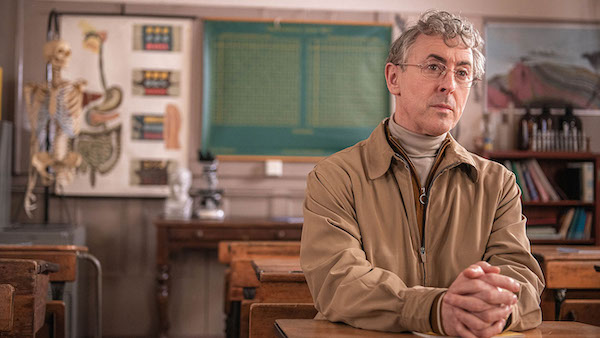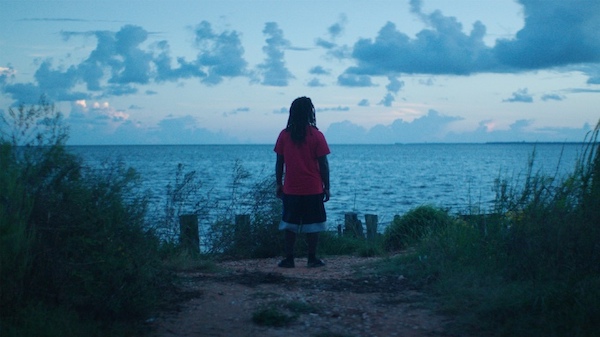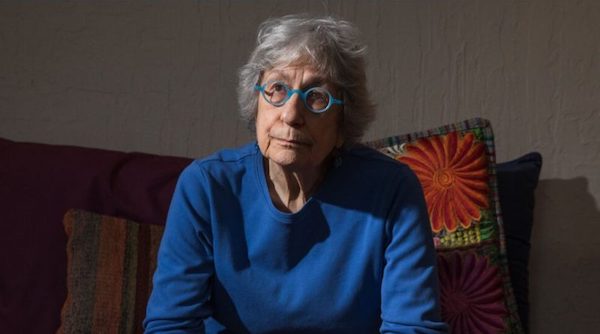Film Reviews: Sundance 2022, Dispatch #6 — Learning from the Past
By Peg Aloi
This dispatch reviews three documentaries that are very different from each other, but are all fascinating and engaging. This was an excellent year for documentaries at Sundance. I will review several more before this year’s dispatches are complete.

Alan Cumming appears in Jono McLeod’s My Old School. Photo: courtesy of Sundance Institute, Tommy Ga-Ken Wan
My Old School is an absorbing documentary about a teenager named Brandon Lee who enrolls at Bearsden Academy, a secondary school in a tony suburb of Glasgow in 1993. At first his fellow students wonder if he has any connection to actor Brandon Lee, Bruce Lee’s son, who died tragically while filming The Crow. Brandon claims to be Canadian, the son of a famous recently deceased opera singer. He’s an excellent student, determined to pursue a medical degree. He is somewhat socially awkward, though that changes once he mentors students with similar problems and decides to audition for the school musical. Eventually it’s revealed that Brandon is hiding a shocking secret; this film explores that revelation via interviews with former students, teachers, and neighbors. There is also footage of Brandon himself from his time at Bearsden. The “real” Brandon refused to appear on camera for the film. Actor Alan Cumming, who had been asked to be in a narrative film version of the story some years ago, fills the role by speaking Brandon’s words from recently recorded interviews. Using animation, archival footage, ’90s music and contemporary interviews, My Old School is part mystery, part character study, part cultural relic, and thoroughly compelling. Filmmaker Jono McLeod is also a former student at Bearsden, and Lee was his classmate, giving this doc an intimate and nostalgic vibe.

A scene from Descendant. Photo: courtesy of Sundance Institute
Winner of Sundance’s US Documentary Special Jury Award for Creative Vision, Descendant is a thoughtful work of historical exploration and cultural awareness. Filmmaker Margaret Brown (The Order of Myths) introduces us to members of the community of what was once called Africatown in Mobile, AL. We are shown their daily lives and gradually learn about their connection to the film’s larger story. Part of that narrative: the discovery of the physical remains of the last slave ship that attempted to dock in America but sank, the Clotilda, whose survivors became residents of Africatown. One of them, Cudjoe Lewis, the last known adult survivor of the Atlantic slave trade between Africa and the United States, was the interview subject for Zora Neale Hurston’s nonfiction study Barracoon, finally published in 2018 after languishing for nearly a century. Another part of the Descendant‘s story: the zoning laws of Africatown were written so that large corporations were free to replace housing with factories that not only spoiled the landscape but caused high rates of cancer among the residents. Individual interviews with descendants of the Clotilda’s survivors form the backbone of this film: their stories are stirring and often heartbreaking. Descendant paints a rich portrait of a community that has had more than its share of trauma and injustice, but which has met these challenges with resilience, grace, and passionate activism.

A scene from The Janes. Photo: courtesy of Sundance Institute
Interestingly, there were a number of films at this year’s festival dealing with the subject of abortion, or, more accurately, the difficulty of obtaining an abortion, such as Happening (which I have not had a chance to see yet). The Janes was, for me, everything I wished Call Jane might have been but wasn’t. This documentary felt like an accurate and true assessment of how the title’s network of abortion providers came to be in 1968: women in Chicago perceived a need and decided to address it. Chicago was a hotbed of social upheaval and political activism in the ’60s, and filmmakers Tia Lessin and Emma Pildes have collected a treasure trove of archival footage: views of protests and other historical events supply a powerful visual context to the story of the Janes. Revealing interviews with the original members of this underground organization are at the center of this story; these women remember, often with wry humor, the obstacles they faced to do what they felt was important and necessary work. The dangers the organization faced were considerable, from the police (who eventually raided their headquarters) to the mafia, which had been running and profiting from so-called “back alley” abortion operations in Chicago at that time. Still, despite the terrifying situations those who sought illegal abortions found themselves in, these determined firebrands did not surrender to fear. The Janes provides a fascinating historical overview of the struggle for abortion access — but also has crucial relevance for the times we’re living in, as the fight for reproductive freedom continues.
Peg Aloi is a former film critic for the Boston Phoenix and member of the Boston Society of Film Critics. She taught film studies in Boston for over a decade. She writes on film, TV, and culture for web publications like Vice, Polygon, Bustle, Mic, Orlando Weekly, Crooked Marquee, and Bloody Disgusting. Her blog “The Witching Hour” can be found at themediawitch.com.
Tagged: Descendant, Emma Pildes, Jono Mcleod, Margaret Brown, My Old School, Peg Aloi, The Janes
